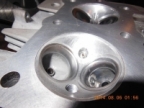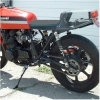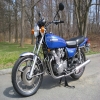how to measure valve clearance
- Nessism
-
- Offline
- Sustaining Member
- Posts: 7595
- Thanks: 2963
Re: how to measure valve clearance
29 Apr 2016 14:31loudhvx wrote: Well, that's sort of the question... whether or not to follow the instructions explicitly or just point the cams away from the valves. I've done both, and there is a slight difference, but usually not enough to make a huge difference as long as you are not trying to hit the very top limit of the clearance range (which is a bad idea anyway). The base circle is pretty big, but depending on position, other valves are compressed or not, and that will affect how much the camshaft is deflected, which will affect the measurement.
Following the manual means being at TDC , at least in the 550 manual. If we assume there is no camshaft deflection (either by bending or moving within the bearing), and we assume the base circle is perfectly round (measuring it shows slight imperfections) then the Clymer's instruction will be the same as the FSM. In practice, the results are not exactly the same. The cmashaft does deflect a tiny bit, and the base circles are not perfectly round.
In my experience the camshaft DOES deflect in the journal clearance when the adjacent valve is not on the base circle. I always make sure both side by side valves are on the base circle so the cam lobes are not pushing up on the cam. My only comment relates to not having to follow a strict TDC approach.
Exhaust valves:
Aim #1 exhaust lobe forward at the gasket surface and then adjust both #1 & #2 exhaust valves. Then repeat with #4 facing forward.
Intake valves:
Aim #1 intake lobe straight up, Doing this will put both #1 & #2 on the base circle so you can check them. Then repeat with #4 facing straight up.
very simple
Ed
Carb O-ring Kits : www.kzrider.com/forum/3-carburetor/61807...-o-ring-kits?start=0
www.kzrider.com/forum/faq-wiki/618026-new-owner-things-to-know
1981 KZ750E2
www.kzrider.com/forum/11-projects/604901...z750e-project-thread
Carb O-ring Kits : www.kzrider.com/forum/3-carburetor/61807...-o-ring-kits?start=0
www.kzrider.com/forum/faq-wiki/618026-new-owner-things-to-know
1981 KZ750E2
www.kzrider.com/forum/11-projects/604901...z750e-project-thread
Please Log in or Create an account to join the conversation.
- Kray-Z
-

- Offline
- User
- I need more power Scotty....
- Posts: 583
- Thanks: 107
Re: how to measure valve clearance
29 Apr 2016 14:45
I am thinking about the dynamics of the running engine and how things like cam journal clearances, cam deflection, imperfections in cam grinding, and adjacent valves can affect valve clearances and timing and such. In that respect, if you are tuning an engine to exact "blueprint" specification, then you would want to use a degree wheel, dial indicator, and piston stop and set the valve lash so the individual cam lobes are centered on the base circle exactly as the valve stem sees it in the running engine, with the cams in their journals and loaded form adjacent valves exactly as the....
Never mind...I'll just point the lobes directly away from the followers and it should work just fine, every time.
Never mind...I'll just point the lobes directly away from the followers and it should work just fine, every time.
2-04 R1, 81 CSR1000, 81 LTD1000, 2-83 GPz1100, 3-79CBX, 81 CBX, 3-XS650, 84 Venture, +parts
Quote "speed costs money...how fast do you want to go?" (Which Z movie?)
Universal formula for how many motorcycles one should own = n + 1, where n is how many motorcycles you own right now....
Quote "speed costs money...how fast do you want to go?" (Which Z movie?)
Universal formula for how many motorcycles one should own = n + 1, where n is how many motorcycles you own right now....
Please Log in or Create an account to join the conversation.
- Patton
-

- Offline
- KZr Legend
- Posts: 18640
- Thanks: 2100
Please Log in or Create an account to join the conversation.
- Kray-Z
-

- Offline
- User
- I need more power Scotty....
- Posts: 583
- Thanks: 107
Re: how to measure valve clearance
29 Apr 2016 15:11Patton - that photo says exactly why you don't want to set valves to tight! Hot combustion gasses squeezing through a small gap (aka an exhaust valve that isn't closed all the way) can remove metal as well as an oxy-acetylene cutting torch!
We had a big block 427 tri-power chevy burn a 1/16" deep , 1/8" wide channel in the block between two cylinders when the head gasket failed. Did a leak down test and air was blowing out the ports of the neighboring cylinder!
2-04 R1, 81 CSR1000, 81 LTD1000, 2-83 GPz1100, 3-79CBX, 81 CBX, 3-XS650, 84 Venture, +parts
Quote "speed costs money...how fast do you want to go?" (Which Z movie?)
Universal formula for how many motorcycles one should own = n + 1, where n is how many motorcycles you own right now....
Quote "speed costs money...how fast do you want to go?" (Which Z movie?)
Universal formula for how many motorcycles one should own = n + 1, where n is how many motorcycles you own right now....
Please Log in or Create an account to join the conversation.
- Nessism
-
- Offline
- Sustaining Member
- Posts: 7595
- Thanks: 2963
Re: how to measure valve clearance
29 Apr 2016 18:18Kray-Z wrote: I am thinking about the dynamics of the running engine and how things like cam journal clearances, cam deflection, imperfections in cam grinding, and adjacent valves can affect valve clearances and timing and such. In that respect, if you are tuning an engine to exact "blueprint" specification, then you would want to use a degree wheel, dial indicator, and piston stop and set the valve lash so the individual cam lobes are centered on the base circle exactly as the valve stem sees it in the running engine, with the cams in their journals and loaded form adjacent valves exactly as the....
Never mind...I'll just point the lobes directly away from the followers and it should work just fine, every time.
Ha ha. Think of it this way: positioning the valves properly is LESS WORK and faster.
Ed
Carb O-ring Kits : www.kzrider.com/forum/3-carburetor/61807...-o-ring-kits?start=0
www.kzrider.com/forum/faq-wiki/618026-new-owner-things-to-know
1981 KZ750E2
www.kzrider.com/forum/11-projects/604901...z750e-project-thread
Carb O-ring Kits : www.kzrider.com/forum/3-carburetor/61807...-o-ring-kits?start=0
www.kzrider.com/forum/faq-wiki/618026-new-owner-things-to-know
1981 KZ750E2
www.kzrider.com/forum/11-projects/604901...z750e-project-thread
Please Log in or Create an account to join the conversation.
- SWest
-

- Offline
- Sustaining Member
- 10 22 2014
- Posts: 23294
- Thanks: 2859
Re: how to measure valve clearance
29 Apr 2016 19:29 - 29 Apr 2016 19:29
I've said it before, I was taught to set the valves with them facing opposite directions. Setting the valves this way has a effect on the cam timing. Before I would just turn the crank so each lobe was pointing away, set all of them on one side then go to the other. That was in 78.
Steve
Steve
Z1b1000 1975 Z1b
kzrider.com/forum/11-projects/598262-kz-...-will-it-live#672882
kzrider.com/forum/2-engine/597654-poser?start=240#704229
kzrider.com/forum/11-projects/598262-kz-...-will-it-live#672882
kzrider.com/forum/2-engine/597654-poser?start=240#704229
Last edit: 29 Apr 2016 19:29 by SWest.
Please Log in or Create an account to join the conversation.
- loudhvx
-

- Offline
- KZr Legend
- Posts: 10864
- Thanks: 1618
Re: how to measure valve clearance
30 Apr 2016 10:09Nessism wrote:loudhvx wrote: Well, that's sort of the question... whether or not to follow the instructions explicitly or just point the cams away from the valves. I've done both, and there is a slight difference, but usually not enough to make a huge difference as long as you are not trying to hit the very top limit of the clearance range (which is a bad idea anyway). The base circle is pretty big, but depending on position, other valves are compressed or not, and that will affect how much the camshaft is deflected, which will affect the measurement.
Following the manual means being at TDC , at least in the 550 manual. If we assume there is no camshaft deflection (either by bending or moving within the bearing), and we assume the base circle is perfectly round (measuring it shows slight imperfections) then the Clymer's instruction will be the same as the FSM. In practice, the results are not exactly the same. The cmashaft does deflect a tiny bit, and the base circles are not perfectly round.
In my experience the camshaft DOES deflect in the journal clearance when the adjacent valve is not on the base circle. I always make sure both side by side valves are on the base circle so the cam lobes are not pushing up on the cam. My only comment relates to not having to follow a strict TDC approach.
Exhaust valves:
Aim #1 exhaust lobe forward at the gasket surface and then adjust both #1 & #2 exhaust valves. Then repeat with #4 facing forward.
Intake valves:
Aim #1 intake lobe straight up, Doing this will put both #1 & #2 on the base circle so you can check them. Then repeat with #4 facing straight up.
very simple
Ok, but, just to be clear, the manual, if followed explicitly, actually has you measure clearances while the adjacent lobe is actually pressing on the valve (and deflecting the camshaft). This means, the manual's method always takes the slop out of the journal, with the cam deflecting away from the valve.
Always measuring at one of the two TDC marks will give better consistency since the cam will always be deflected the same amount when re-measuring the same valve multiple times.
1981 KZ550 D1 gpz.
Kz550 valve train warning.
Other links.
Kz550 valve train warning.
Other links.
Please Log in or Create an account to join the conversation.
- Nessism
-
- Offline
- Sustaining Member
- Posts: 7595
- Thanks: 2963
Re: how to measure valve clearance
30 Apr 2016 14:30 - 30 Apr 2016 14:30loudhvx wrote: Ok, but, just to be clear, the manual, if followed explicitly, actually has you measure clearances while the adjacent lobe is actually pressing on the valve (and deflecting the camshaft). This means, the manual's method always takes the slop out of the journal, with the cam deflecting away from the valve.
Sorry, but I believe you are incorrect. The FSM specified method puts both adjacent valves on the base circle at the same time, thus you set the cam position and then check the clearance on two valves at the same time. This could not be done if the adjacent lobe was depressing the valve.
Ed
Carb O-ring Kits : www.kzrider.com/forum/3-carburetor/61807...-o-ring-kits?start=0
www.kzrider.com/forum/faq-wiki/618026-new-owner-things-to-know
1981 KZ750E2
www.kzrider.com/forum/11-projects/604901...z750e-project-thread
Carb O-ring Kits : www.kzrider.com/forum/3-carburetor/61807...-o-ring-kits?start=0
www.kzrider.com/forum/faq-wiki/618026-new-owner-things-to-know
1981 KZ750E2
www.kzrider.com/forum/11-projects/604901...z750e-project-thread
Last edit: 30 Apr 2016 14:30 by Nessism.
Please Log in or Create an account to join the conversation.
- 650ed
-

- Offline
- User
- Posts: 15343
- Thanks: 2829
Re: how to measure valve clearance
30 Apr 2016 14:47 - 01 May 2016 08:00
I may have misunderstood, so forgive if that's the case; but forthe KZ650 if you follow the FMS you don't check the clearances of adjacent valves. You check 1&3 and then after repositioning the cam you check 2&4, etc. Ed
Attachment 00003a-2-3-4-5-6-7-8-9-10-11-12-13-14-15-16.jpg not found
1977 KZ650-C1 Original Owner - Stock (with additional invisible FIAMM horn)
Attachments:
Last edit: 01 May 2016 08:00 by 650ed.
The following user(s) said Thank You: KZB2 650
Please Log in or Create an account to join the conversation.
- Nessism
-
- Offline
- Sustaining Member
- Posts: 7595
- Thanks: 2963
Re: how to measure valve clearance
30 Apr 2016 15:22
I believe I'm mistaken on the Kawasaki FSM adjustment method too.
With the #1 or #4 exhaust lobe pointing forward that puts both adjacent valves on the base circle, however the FSM doesn't specify checking the adjacent valves at the same time. Not sure why though.
With the #1 or #4 exhaust lobe pointing forward that puts both adjacent valves on the base circle, however the FSM doesn't specify checking the adjacent valves at the same time. Not sure why though.
Ed
Carb O-ring Kits : www.kzrider.com/forum/3-carburetor/61807...-o-ring-kits?start=0
www.kzrider.com/forum/faq-wiki/618026-new-owner-things-to-know
1981 KZ750E2
www.kzrider.com/forum/11-projects/604901...z750e-project-thread
Carb O-ring Kits : www.kzrider.com/forum/3-carburetor/61807...-o-ring-kits?start=0
www.kzrider.com/forum/faq-wiki/618026-new-owner-things-to-know
1981 KZ750E2
www.kzrider.com/forum/11-projects/604901...z750e-project-thread
Please Log in or Create an account to join the conversation.
- loudhvx
-

- Offline
- KZr Legend
- Posts: 10864
- Thanks: 1618
Re: how to measure valve clearance
01 May 2016 07:22 - 01 May 2016 10:47
The manual has you measure 1 and 3 exhaust at the same time, when at the 2-3 T mark. That can only be done when the #2 exhaust lobe points backward, not forward. #2 will still be pressing on the valve in that position. #1 lobe will be upward and #3 lobe will be forward.
It says to measure "#1 and #3, or #2 and #4". I interpret that to mean you are to measure the pair 1 and 3, or the pair 2 and 4. And not any other combination at that particular crank position. As in, not "1 and 2", and not "3 and 4".
It also has you measure 2 and 4 exhaust at the same time, when at the 2-3 T mark. That can only be done when the #3 lobe is pointing backward and pressing.
When I say "pressing", I mean lightly pressing. The main part of the lobe is not on the valve, but the opening or closing ramp is on the valve. It is enough to take the slop out of the bearing. Incidentally, the other non-measurable valve, in this case #4, is pointing downward, but not directly on the valve. It may be pressing harder than #2, but still not at full force.
The intake is done similarly.
The whole point is to get the slop out of the bearings and measure at a precisely repeatable position. That eliminates a lot of variables.
In this animation, the long pause is when 1 is at TDC, and is under fire. That is followed by short pauses at TDC for 2, 4 and 3...in the normal firing order. (yes, I have a little time invested in this discussion , as I'm sure others do as well)
, as I'm sure others do as well)
If the animation doesn't clearly show 1 2 4 3 regularly, it might help to open the image link in a new browser window. Slow computers might not show the animation smoothly.
I see Ed (650ed) has the instructions posted for the 650.
Here's the 550.
Exhaust instructions
Intake instructions
I would recommend this as a sticky post, but it shouldn't be necessary if we just read the text of the FSM, and follow it exactly. It seems I've read that advice somewhere around here once or twice. :laugh:
It says to measure "#1 and #3, or #2 and #4". I interpret that to mean you are to measure the pair 1 and 3, or the pair 2 and 4. And not any other combination at that particular crank position. As in, not "1 and 2", and not "3 and 4".
It also has you measure 2 and 4 exhaust at the same time, when at the 2-3 T mark. That can only be done when the #3 lobe is pointing backward and pressing.
When I say "pressing", I mean lightly pressing. The main part of the lobe is not on the valve, but the opening or closing ramp is on the valve. It is enough to take the slop out of the bearing. Incidentally, the other non-measurable valve, in this case #4, is pointing downward, but not directly on the valve. It may be pressing harder than #2, but still not at full force.
The intake is done similarly.
The whole point is to get the slop out of the bearings and measure at a precisely repeatable position. That eliminates a lot of variables.
In this animation, the long pause is when 1 is at TDC, and is under fire. That is followed by short pauses at TDC for 2, 4 and 3...in the normal firing order. (yes, I have a little time invested in this discussion
If the animation doesn't clearly show 1 2 4 3 regularly, it might help to open the image link in a new browser window. Slow computers might not show the animation smoothly.
I see Ed (650ed) has the instructions posted for the 650.
Here's the 550.
Exhaust instructions
Intake instructions
I would recommend this as a sticky post, but it shouldn't be necessary if we just read the text of the FSM, and follow it exactly. It seems I've read that advice somewhere around here once or twice. :laugh:
1981 KZ550 D1 gpz.
Kz550 valve train warning.
Other links.
Kz550 valve train warning.
Other links.
Last edit: 01 May 2016 10:47 by loudhvx.
The following user(s) said Thank You: Nessism, The_Proletariat, Casey H
Please Log in or Create an account to join the conversation.
- loudhvx
-

- Offline
- KZr Legend
- Posts: 10864
- Thanks: 1618
Re: how to measure valve clearance
01 May 2016 08:17 - 01 May 2016 08:42
650ed or Nessism Ed: I don't have a 650 FSM, can you explain something:
I see they are referring to an EX mark on the exhaust cam sprocket and a "T" mark on the intake sprocket.
When the exhaust "EX" mark is aligned with the valve cover deck, which pistons are at TDC?
I think it's 2 and 3, but that would make the timing marks different between 550 and 650.
When the intake "T" mark is aligned with the valve cover deck, which pistons are at TDC?
I think it's 1 and 4.
On the 550, when the ex mark on the exhaust sprocket is aligned with the deck, 1 and 4 are at TDC.
I see they are referring to an EX mark on the exhaust cam sprocket and a "T" mark on the intake sprocket.
When the exhaust "EX" mark is aligned with the valve cover deck, which pistons are at TDC?
I think it's 2 and 3, but that would make the timing marks different between 550 and 650.
When the intake "T" mark is aligned with the valve cover deck, which pistons are at TDC?
I think it's 1 and 4.
On the 550, when the ex mark on the exhaust sprocket is aligned with the deck, 1 and 4 are at TDC.
1981 KZ550 D1 gpz.
Kz550 valve train warning.
Other links.
Kz550 valve train warning.
Other links.
Last edit: 01 May 2016 08:42 by loudhvx.
Please Log in or Create an account to join the conversation.

